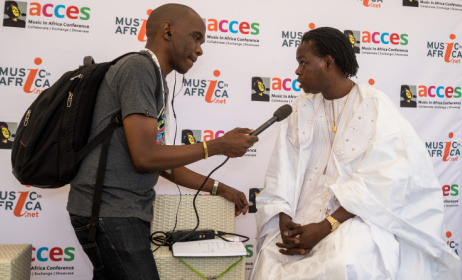MI Abaga proves words matter in music journalism
Beyond the chest-beating, ego-stroking and expletive-laden emotional outbursts that occurred during MI’s appearance on Pulse Nigeria's Loose Talk Podcast, the interview-turned-shout-fest was revealing of Nigerian music journalism.
 MI Abaga emphasised the importance of words and syntax in a podcast hosted by a pair of journalists. Photo: Facebook
MI Abaga emphasised the importance of words and syntax in a podcast hosted by a pair of journalists. Photo: Facebook
MI Abaga, self-professed “Africa rapper number one” and CEO of Chocolate City, accompanied by artist Loose Kaynon, was hosted by journalists Osagie Alonge and Ayomide Tayo, who had written “An open letter to Nigeria's rap legend”. The article was part fan mail, part criticism of the direction of MI’s career.
“The spark is gone,” wrote Tayo. “The flows are not the same and the bars have gone soft bro. It seems there’s no more soul in your music. Everything has gone cold.”
After reading the article, MI ranted about its content on Twitter. “Stop writing about us in our lowest moments or failures.. (sic)” and “Support us while we are up!!! Fucking vulture behavior” were some of his statements. He then promised a direct response. “I am shifting a flight to come to your podcast tomorrow to discuss this article and general concerns about your non-support of music,” he said.
The motivation for MI’s outburst and push for a better narrative about his work and that of other artists is clear to anyone familiar with show business. His ambitions as an artist and record label boss imply he would rather have interactions of the press with his work and person be permanently positive.
MI’s suggestion that journalists meet with artists to tell “balanced stories” isn’t wrong-headed—although he also admits not making time to speak to journalists—but interviews and profiles do not preclude criticism. The entirety of an artist’s relationship with the fourth estate cannot be for them to be her public relations and image management team. That’s the duty of publicists.
MI’s primary grouse with the article, however, was Tayo asking: “What’s happening M.I? Why has the music suffered? I won't lie. The fan in me rated "The Chairman" album highly. The collaborative approach to its production got me. Sadly, that LP had a short shelf-life partly due to the lyrics which were below your very high standards.”
The rapper insisted that saying The Chairman had a short shelf-life is false, a claim he supported with numbers from iTunes. The strength of his defense can be equivocated, but his argument that the shelf-life of an album is verifiable and can only be measured in numbers is true. No other metric exists to check how well an album is performing years after its release—quality notwithstanding.
For all of his ulterior motives and apparent condescension, MI was right about one thing: facts are sacrosanct. It is a shame that it took an artist to point this out to apparent OGs of Nigerian music journalism.
The term ‘Original/Old Gangster’—hip hop culture equivalent of the much abused ‘veteran’—carries the suggestion that those who bear it understand the basics of their game. The indisputability of facts is essential to journalism. It is one of the first lessons learnt by rookie journalists.
Tayo wrote an opinion piece, but in putting forward his argument he employed the service of facts. Now, facts can be framed in support of a lie—often a veteran journalist move—but the details of facts cannot be changed or journalists lose credibility or their jobs.
"Words matter,” as MI said on the podcast. “Grammatical errors and improper syntax” matter. Journalists may be referred to as veterans on account of their body of work and deep cultural knowledge, but none of these matters in writing when words are misused. The page knows no original gangsters. The internet has the memory of an elephant, but the attention span of a gnat. In writing, as it is in rap, you’re only as good as your last success—or failure.
While defining their own work as “curating history”, Alonge also commented on the work of Nigerian music journalists past. “Legacy newspapers have never, in time, been strong critics of art in Nigeria,” he said, referring to the work of news publishers like the Punch and Guardian newspapers. This statement—like that of his colleague about the shelf-life of MI’s The Chairman album—is verifiable. It is false.
“Journalism before us failed to curate what was happening then,” said Ayomide Tayo. “With journalism in the 80s, 70s and 90s, they focused on gossip and soft sell.”
Renowned critic and journalist Benson Idonije would probably utter expletives—if he is so inclined—on listening to his work and that of his colleagues described as gossip and soft-sell.
The older generation of journalists have the poor archival skills of their publishers to blame for amnesia about their work, but a journalist—who curates history—should know better than make unqualified statements about recent, verifiable facts. The deft use of the adjective ‘most’ could have saved the statements above. Words matter.
Nigerian pop artists are notorious for their disregard of words. They have beat and dance to bail them out of the inevitable messiness of language. Critics and journalists, however, cannot set their words to a beat. All we have are words and their ability to convey truth and taste in a manner that is clear to the audience. Critics and journalists should know this, whether they be rookies or OGs.




























Comments
Log in or register to post comments